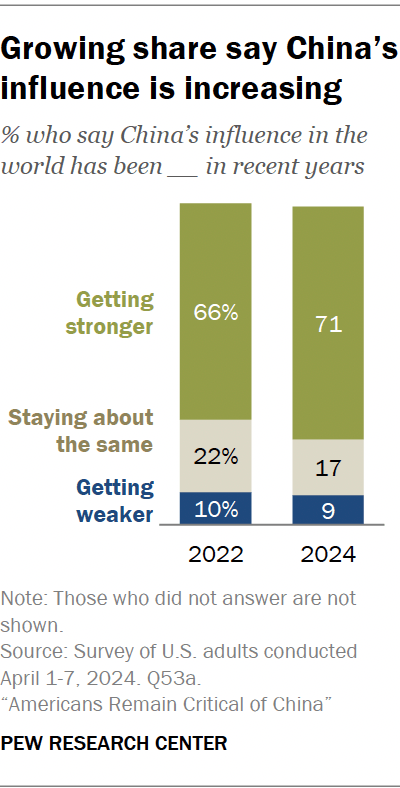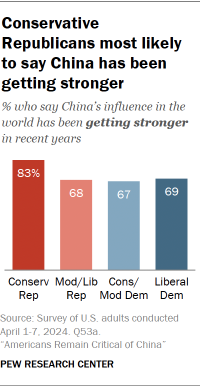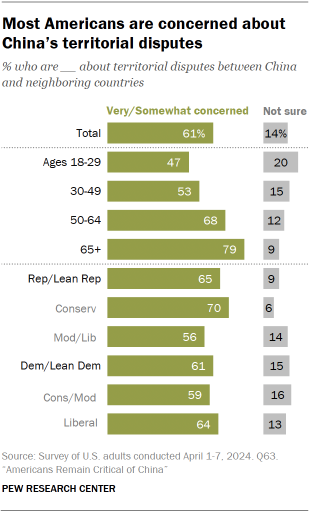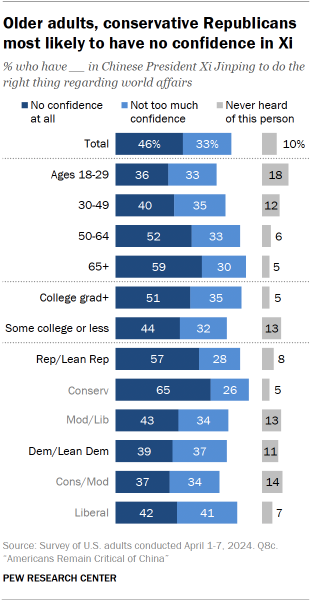Americans have overwhelmingly negative opinions of China, a nation they see as becoming increasingly influential. This image of China is accompanied by concern about its relationship with its neighbors and widespread distrust in its president.
Unfavorable views of China prevail
U.S. views of China have not changed significantly since last year. Most Americans still hold an unfavorable view of the country (81%), including 43% who say their opinion is very unfavorable. In contrast, only 16% see China favorably. China has been seen unfavorably by three-quarters or more of U.S. adults since 2020.
Age and education
Unfavorable views of China are more common among older Americans, especially those ages 65 and older. Among this group, 61% report a very unfavorable view of China, while only 27% of adults under 30 say the same.
Though Americans of all education levels see China unfavorably, views are more negative among those with more education. Some 87% of Americans with a four-year college degree have a negative opinion of China, compared with 78% of adults without a college degree.
Party and ideology
Republicans and Republican-leaning independents view China more unfavorably than Democrats and Democratic leaners do (90% vs. 77%). Conservative Republicans are particularly critical: About seven-in-ten (68%) hold a very unfavorable view of the country.
Economic attitudes
At least three-quarters of Americans hold unfavorable views of China regardless of how they rate the U.S. economy. Still, unfavorable views of China are more common among those who say the U.S. economy is doing poorly. Among Americans who think the current economic situation is bad, 84% have an unfavorable view of China, including 48% with a very unfavorable view. In comparison, 75% of those who think the U.S. economic situation is good see China unfavorably.
China’s international influence
How Americans evaluate China is tied to how they see China’s role in the world. Unfavorable views of China are more common among those who think China’s influence has grown in recent years (85%) than among those who think China’s influence has waned (72%) or stayed about the same (75%). Similarly, Americans who think China has at least a fair amount of influence on the U.S. economy are more negative on China than those who see not too much economic influence or no influence at all (84% vs. 71%).
China’s role in the world

Roughly seven-in-ten Americans (71%) think China’s influence in the world has been growing in recent years. This is a modest but significant increase from the 66% who said the same in 2022.
China’s economic influence
Americans’ evaluations of the change in China’s global influence are related to their ratings of its economic influence on the U.S.: 75% of those who say China has at least a fair amount of impact on the U.S. economy see China’s general influence in the world getting stronger. In comparison, 51% of Americans who do not see a significant economic impact on the U.S. say the same.
Age, gender and education
A number of demographic factors play a role in evaluations of China’s influence. Older Americans – those ages 50 and older – are more likely than those ages 18 to 49 to say China’s influence has grown recently (75% vs. 67%). A greater share of men than women hold this view, and older men stand out in particular. Eight-in-ten men ages 50 and older say China’s influence is on the rise, compared with 71% of older women and 72% of younger men. For their part, women ages 18 to 49 are least likely to say China’s influence has been growing (63%).

Americans with a four-year college degree are also more likely to believe China’s global influence has recently gotten stronger. Roughly eight-in-ten say this (77%), compared with 68% of adults without a college degree.
Party and ideology
Republicans are 10 percentage points more likely than Democrats to say China’s influence in the world is getting stronger (78% vs. 68%).
This opinion is notably concentrated among conservative Republicans: 83% say China’s influence has been getting stronger in recent years, compared with 68% of moderate and liberal Republicans. In fact, moderate and liberal Republicans are about as likely as conservative and moderate Democrats or liberal Democrats to hold this view.
China’s territorial disputes
We also asked Americans how concerned they are about territorial disputes between China and its neighboring countries. Roughly six-in-ten say they are at least somewhat concerned, including 20% who describe themselves as very concerned. About a quarter (24%) are not too concerned or not concerned at all, and 14% of Americans say they are not sure.

When this question was last asked in 2015 – as part of a phone survey – 72% were at least somewhat concerned with China’s territorial disputes, including 30% who were very concerned.
Age
Age plays a significant role in Americans’ level of concern about territorial disputes between China and its neighboring countries. Adults ages 65 and older are more concerned than any other age group: About eight-in-ten older Americans are concerned, compared with no more than roughly seven-in-ten in younger age groups.
Party and ideology
While concerns about territorial disputes are roughly equal among Republicans and Democrats, there are ideological differences within the Republican Party. Seven-in-ten conservative Republicans are at least somewhat concerned about China’s territorial disputes, including 30% who say they are very concerned. By comparison, 56% of moderate and liberal Republicans are concerned, including only 18% who are very concerned.
Americans lack confidence in Xi Jinping

About eight-in-ten Americans have little or no confidence in Chinese President Xi Jinping to do the right thing regarding world affairs (79%). Only 9% report some or a lot of confidence in Xi, and another 10% say they have never heard of him.
Age and education
Confidence in the Chinese president is lower among older Americans. A majority of those ages 65 and older have no confidence at all in Xi (59%), compared with 36% of those ages 18 to 29. Young adults are nearly four times more likely than those in the oldest age group to say they have never heard of the Chinese president (18% vs. 5%).
Americans with at least a four-year college degree report less confidence in Xi than those without a college degree. Among adults with a college degree or more education, 51% have no confidence at all in Xi; 44% of those without agree.
Party and ideology
Republicans express less confidence in Xi than Democrats do. About six-in-ten Republicans have no confidence at all in Xi (57%), more than the 39% of Democrats who say the same. Among Republicans, conservatives are significantly more likely than moderate and liberal Republicans to have no confidence whatsoever in Xi (65% vs. 43%). There is no significant difference between conservative and moderate Democrats and liberal Democrats on this question.

